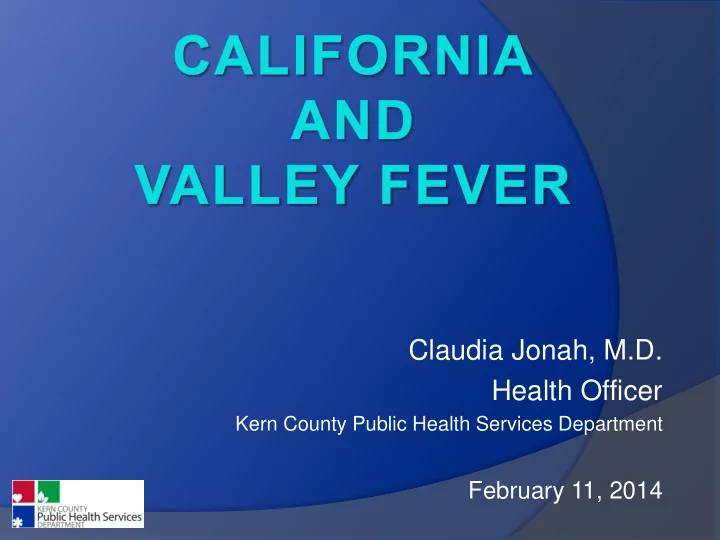

Claudia Jonah, M.D. Health Officer Kern County Public Health Services Department February 11, 2014
10 Core Functions of Public Health
Core Function Applications Inform, Educate, Empower Mobilize Community Partnerships Policy Development
Why take Valley Fever Seriously? Screening test exists, but not available Curative medicines don’t exist No vaccine available for prevention
Entering the San Joaquin Valley
COCCIDIOIDOMYCOSIS (Kok-sid-e-oi ” -do-mi-ko ’ -sis) SAN JOAQUIN VALLEY FEVER VALLEY FEVER COCCI COCCY
What is Valley Fever? Coccidioidomycosis is a fungus commonly found in “desert - type” soil Inhaling the fungus can lead to infections that may or may not cause symptoms (1 - 4 weeks onset) Infections are not passed from person to person (tissue transplants are an exception). Risk for infection can be reduced
How Serious is Valley Fever? 1,000 Infections (100%) 600 400 Asymptomatic Symptomatic (60%) (40%) 50 5 Pulmonary Disseminated Residuals (.005%) (5%)
Symptoms of Valley Fever Fatigue Backache Chest pain Night sweats Fever Sore throat Chills Loss of appetite Cough Rashes Headache Tender bumps on shins
Events That Can Transmit Valley Fever Naturally occurring disturbance of soil
Activities That Can Transmit Valley Fever Recreation – Off Road Vehicles Earth Moving – Land Development Mining - Oil Drilling Home Gardening / Landscaping Earth Tilling - Agriculture
Unrecognized Sources Of Exposure Several major highways run through San Joaquin Valley
Higher Risk Populations
Awareness Pediatrics Veterinarians Off-Road Vehicle Use Occupational
Ways to Reduce Risk Avoid outdoor activities during windy conditions Set vehicle vents to recirculate Close windows Moisten soil prior to disturbing Moisten dust prior to clean-up following dust storms Masks
Resources for more Information kerncountyvalleyfever.org www.cdph.ca.gov/.../ Coccidioidomycosis www.vfce.arizona.edu
Recommend
More recommend